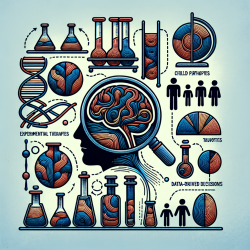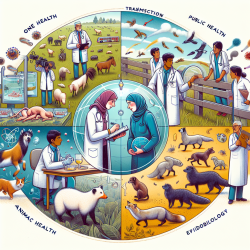Recent research titled "Knowledge about childhood autism and opinion among healthcare workers on availability of facilities and law caring for the needs and rights of children with childhood autism and other developmental disorders in Nigeria" sheds light on the current state of awareness and facilities for managing autism in Nigeria. As practitioners focused on creating better outcomes for children, it is imperative to leverage these findings to improve our practices and advocate for necessary changes.
The study, which involved 134 healthcare workers from tertiary institutions in Nigeria, revealed significant knowledge gaps about childhood autism, particularly in understanding obsessive and repetitive behaviors, social interaction impairments, and the nature of autism and its co-morbidities. The mean score on the Knowledge about Childhood Autism among Health Workers (KCAHW) questionnaire was 12.35 out of 19, indicating a moderate level of knowledge with room for improvement.
Key findings include:
- Healthcare workers with previous experience managing children with autism scored higher on the KCAHW questionnaire.
- Those in psychiatric specialties showed better knowledge compared to their pediatric counterparts.
- Significant gaps were found in understanding the symptoms of obsessive and repetitive behaviors, followed by social interaction impairments, and communication impairments.
- More than half of the respondents believed that facilities and laws to support children with autism are lacking in Nigeria.
These findings have several implications for improving autism care:
1. Targeted Training and Continuous Education
Healthcare workers, especially those in primary and secondary care, should receive targeted training to fill identified knowledge gaps. Continuous education programs can help update their understanding of autism, ensuring early diagnosis and intervention, which are crucial for better outcomes.
2. Multidisciplinary Approach
Adopting a multidisciplinary approach that includes behavioral therapy, special education, communication training, and medical management can significantly improve care for children with autism. Training facilities should be established to prepare professionals across these disciplines.
3. Policy Advocacy
Healthcare workers and stakeholders should advocate for policies that establish and enforce laws protecting the rights of children with autism. This includes creating intervention facilities that address both medical and social needs.
4. Research and Data Collection
Future research should focus on collecting baseline epidemiological data to guide policy and planning. Understanding the prevalence and distribution of autism in Nigeria can help tailor interventions to meet the specific needs of the population.
By implementing these recommendations, practitioners can play a pivotal role in enhancing the care and support for children with autism in Nigeria. To read the original research paper, please follow this link: Knowledge about childhood autism and opinion among healthcare workers on availability of facilities and law caring for the needs and rights of children with childhood autism and other developmental disorders in Nigeria.










